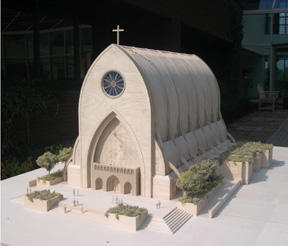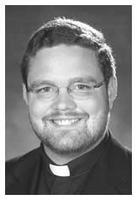This past weekend I had the privilege of attending the ordination Mass of Fr. Craig Timmerman (and Fr. Mark Steffl, who I did not know) at Holy Trinity Cathedral in New Ulm, MN, and Fr. Craig's first Mass in our home parish of St. Clotilde in Green Valley, MN. Both services were beautiful, and left me acutely grateful for the gift God has given us in his faithful servant.
One particular item that had an impact upon me came from one of the musical pieces that was a part of both services: the Latin hymn “Tu es Sacerdos” (“You are a Priest”). The words to the hymn are concise and come straight from Psalm 110 (Psalm 109 in some Bible translations): “The Lord has sworn and will not change his mind, ‘You are a priest forever after the order of Melchizedek.’”
I was only slightly familiar with the name Melchizedek, but was really moved with this hymn, and pondered its significance. What was so important about this guy that we would be singing about him at a priestly ordination Mass? And what did this signify about the priesthood into which Fr. Craig was initiated?
After a little research and reflection things started coming together a bit.
Melchizedek, if you recall, is a figure who makes but a brief appearance in the book of Genesis. Blink and you’ll miss him, it’s that quick. In Genesis chapter 14, the encounter reads thus: "And Melchizedek king of Salem brought out bread and wine; he was priest of God Most High. And he blessed him and said, 'Blessed be Abram by God Most High, maker of heaven and earth; and blessed be God Most High, who has delivered your enemies into your hand!' And Abram gave him a tenth of everything." (Gen 14:18-20)
That's it. No flowery monologue. Just straight to the point, he shows up, a couple things happen, and then he's gone. But we do learn some interesting things about him: he was king of Salem (fun fact: "Salem" means peace; Salem will eventually become the city we know of as Jerusalem.), he brought out bread and wine, and he was a priest.
Though it was brief, he evidently made enough of a splash that he is mentioned later in the Old Testament. In Psalm 110 (where our song lyrics came from) David says
The LORD says to my lord: "Sit at my right hand, till I make your enemies your footstool." The LORD sends forth from Zion your mighty scepter. Rule in the midst of your foes! Your people will offer themselves freely on the day you lead your host upon the holy mountains. From the womb of the morning like dew your youth will come to you. The LORD has sworn and will not change his mind, "You are a priest for ever after the order of Melchizedek." (Ps 110:1-4)
Who is he talking about here? The coming Messiah. ("The LORD says to my lord" indicates that God - "uppercase" LORD - is speaking to the Messiah - "lowercase" lord.) The Messiah will be a priest "after the order of Melchizedek".
Because this was the commonly understood Jewish exegesis of this scripture, Paul references Jesus in this context, indicating his role as the promised Messiah: "where Jesus has gone as a forerunner on our behalf, having become a high priest for ever after the order of Melchizedek." (Heb 6:20)
Now, a note about the priesthood in the Old Testament. The priesthood was reserved to the tribe of Levi, and a special role was reserved to the descendants of Aaron. They stood as a mediator between the Lord and the people, kept watch over the Ark of the Covenant (later in the temple in Jerusalem), and offered sacrifices for sins. As the Catechism of the Catholic Church (CCC) indicates, this priesthood is a foreshadowing of the ministerial priesthood initiated by Jesus Christ:
The liturgy of the Church, however, sees in the priesthood of Aaron and the service of the Levites, as in the institution of the seventy elders, a prefiguring of the ordained ministry of the New Covenant. (CCC 1541)
The interesting thing to note is that Paul, in Hebrews 7, vigorously stresses that Christ's priesthood in the order of Melchizedek far surpasses the Levitical priesthood:
Those who formerly became priests took their office without an oath, but this one was addressed with an oath, "The Lord has sworn and will not change his mind, 'Thou art a priest for ever.'" This makes Jesus the surety of a better covenant. The former priests were many in number, because they were prevented by death from continuing in office; but he holds his priesthood permanently, because he continues for ever. Consequently he is able for all time to save those who draw near to God through him, since he always lives to make intercession for them. For it was fitting that we should have such a high priest, holy, blameless, unstained, separated from sinners, exalted above the heavens. He has no need, like those high priests, to offer sacrifices daily, first for his own sins and then for those of the people; he did this once for all when he offered up himself. Indeed, the law appoints men in their weakness as high priests, but the word of the oath, which came later than the law, appoints a Son who has been made perfect for ever. (Heb 7:21-28)
Is Paul here diminishing the role of the Old Testament priests? No. But he
is showing, that while still necessary for their time and place, their priesthood was merely a temporary surrogate for the everlasting Priesthood of Jesus Christ. While their sacrifice offerings needed to be repeated, his ultimate self-gift was only necessary once.
So, back to Fr. Craig's ordination. If his ordained ministry was prefigured by the Levitical priesthood of the Old Testament (as opposed to the priesthood of Melchizedek, which uniquely pointed to Christ's), then why were we singing "You are a priest forever after the order of Melchizedek" at his ordination? The CCC beautifully ties this together (emphasis mine):
It is the same priest, Christ Jesus, whose sacred person his minister truly represents. Now the minister, by reason of the sacerdotal consecration which he has received, is truly made like to the high priest and possesses the authority to act in the power and place of the person of Christ himself (virtute ac persona ipsius Christi).
Christ is the source of all priesthood: the priest of the old law was a figure of Christ, and the priest of the new law acts in the person of Christ. (CCC 1548)
So in offering sacrifices for sins, the Levitical priesthood's function was to foreshadow Christ's eventual self-sacrifice. Now that this redemptive act is complete, the priesthood's role has changed for the New Covenant - instead of offering new sacrifices, he instead "makes present" Christ's definitive sacrifice for all of us. And when does he do this? When he celebrates Mass.
Thus, the purpose of our song at Fr. Craig's ordination was to affirm Christ's singular role as High Priest, whose offering of himself purchased redemption from our sins. But it was also to give glory and thanks to the Lord that we were being given the gift of another priest who, through his ministerial consecration, was authorized to make that sacrifice present to all of us, wherever and whenever we receive the Eucharist.
God is good indeed!




